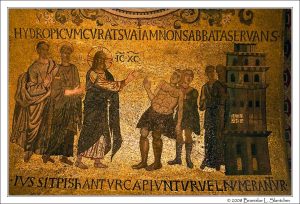 Fourth Sunday after Pentecost
Fourth Sunday after Pentecost
St. Paul tells us, “Freed from sin, you have become slaves of righteousness. (Romans 6:18)” Slaves? Slavery is a demeaning word. Are we slaves of God? Didn’t Jesus tell us, “I no longer call you slaves … I have called you my friends, because I have told you everything I have heard from my Father. (John 15:15) But listen carefully to what St. Paul says, “I am speaking in human terms because of the weakness of your nature. (Romans 6:19)” He is correcting our idea of freedom. We think freedom means freedom of choice – to decide to obey God or to sin. But to sin is to put ourselves into slavery to evil, and the only way to escape is to think of ourselves as slaves of God, for obedience brings life but “the wages of sin is death. (Romans 6:23)”
Therefore, when we receive Holy Communion, the priest says, “The servant of God (name) receives … The Greek word for “slave,” which St. Paul uses is “doulos,” which means “slave” (in Slavonic, rab). The same word is used for both men and women, for we are all “slaves,” of God – in human terms – but “friends” in divine terms. We cannot and must not make ourselves slaves of what is sinful or evil. The centurion in the Gospel this Sunday understood this very well. He knew what it meant to give commands and to be obeyed and then to obey God. The centurion said, “For I too am a person subject to authority, with soldiers subject to me. And I say to one, ‘Go,’ and he goes; and to another, ‘Come here,’ and he comes; and to my slave, ‘Do this,’ and he does it … “only say the word, [Master], and my servant will be healed. (Matthew 8:9)” Jesus marveled at his faith. Only faith in God and faithfulness to his word can bring us real and authentic freedom.
Meditation by Archpriest David Petras